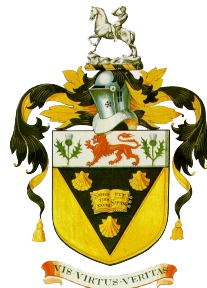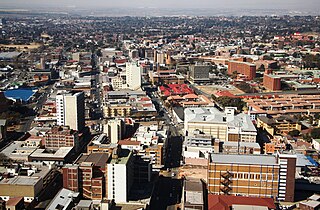Related Research Articles
Rand may refer to:

The South African rand, or simply the rand, is the official currency of the Southern African Common Monetary Area: South Africa, Namibia, Lesotho and Eswatini. It is subdivided into 100 cents.

Rhodes University is a public research university located in Makhanda (Grahamstown) in the Eastern Cape Province of South Africa. It is one of four universities in the province. Established in 1904, Rhodes University is the province's oldest university, and it is the sixth oldest South African university in continuous operation, being preceded by the University of the Free State (1904), University of Witwatersrand (1896), University of South Africa (1873) as the University of the Cape of Good Hope, Stellenbosch University (1866) and the University of Cape Town (1829). Rhodes was founded in 1904 as Rhodes University College, named after Cecil Rhodes, through a grant from the Rhodes Trust. It became a constituent college of the University of South Africa in 1918 before becoming an independent university in 1951.

Allan Aubrey Boesak is a South African Dutch Reformed Church cleric, politician and anti-apartheid activist. He was sentenced to prison for fraud in 1999 but was subsequently granted an official pardon and reinstated as a cleric in late 2004.

Germiston, also known as kwaDukathole, is a city in the East Rand region of Gauteng, South Africa, administratively forming part of the City of Ekurhuleni Metropolitan Municipality since the latter's establishment in 2000. It functions as the municipal seat of Ekurhuleni, hosting the municipal council and administration.
Fasken Martineau DuMoulin LLP is an international business law firm with approximately 925 lawyers and offices in Vancouver, Surrey, Calgary, Toronto, Ottawa, Montréal, Québec City, London and Johannesburg. The firm traces its origins to a predecessor firm that was originally founded in 1863. On 29 November 2017, the firm announced that it was changing its brand name from Fasken Martineau to Fasken.
The following lists events that happened during 1936 in South Africa.

Sir Herbert Baker was an English architect remembered as the dominant force in South African architecture for two decades, and a major designer of some of New Delhi's most notable government structures. He was born and died at Owletts in Cobham, Kent.
Mandela and Tambo was a South African law firm established by Nelson Mandela and Oliver Tambo in Johannesburg in late 1952. It was the first "Attorney Firm" in the country to be run by black partners.
Ferreirasdorp is an inner-city suburb of Johannesburg, South Africa located in Region F of the City of Johannesburg Metropolitan Municipality.
Brett Murray is a South African artist mostly known for his steel and mixed media wall sculptures. He was born in Pretoria, South Africa. Murray has a master's degree in fine art from the Michaelis School of Fine Art, 1989. Referred to by critic Brenda Atkinson as "the dark prince of South African pop (art)", Murray is one of the country's most popular artists, often using easily recognisable media images with the addition of a subversive and bitterly funny twist. Murray's work addresses the wars of the cultures, the clash between Afrocentrism and Eurocentrism, the old and the new South Africas. "With my work I hope to critically entertain. Through satirical and tragic reflections on South Africa, I hope to shift people's perspectives and change people's minds, indulgent, arrogant and pretentious as this might sound," he says. More recently, his work has explored his own personal experiences and identity. Murray was also the founder of the sculpture department at Stellenbosch University.
The Rand Daily Mail was a South African newspaper published from 1902 until it was controversially closed in 1985 after adopting an outspoken anti-apartheid stance in the midst of a massive clampdown on activists by the security forces. The title was based in Johannesburg as a daily newspaper and best known for breaking the news about the apartheid state's Muldergate Scandal in 1979. It also exposed the truth about the death in custody of anti-apartheid activist Steve Biko, in 1977.

Sir Lionel Phillips, 1st Baronet was a British-born South African financier, mining magnate and politician.
Eric Rosenthal, was a South African historian and writer. He was born in Newlands, Cape Town, Cape Colony. He studied as an attorney, later becoming a journalist and writer of many corporate histories. He was a member of the Three Wise Men on Springbok Radio's long-running quiz show, Test the Team.

The Big Five law firms is a term informally used in South Africa to refer to those law firms which, collectively, are perceived to be the leading law firms based in South Africa.
The Legal Resources Centre (LRC) is a human rights organisation based in South Africa with offices in Johannesburg (including a Constitutional Litigation Unit), Cape Town, Durban and Grahamstown. It was founded in 1979 by a group of prominent South African lawyers, including Arthur Chaskalson, Felicia Kentridge, and Geoff Budlender, under the guidance of American civil rights lawyers Jack Greenberg and Michael Meltsner, then Director-Counsel and former First Assistant Counsel of the NAACP Legal Defense and Educational Fund respectively.
Safika Holdings (PTY) Limited www.safika.co.za is a South African investment holding company headed by Nelson Mandela's fellow political prisoners Sakumzi 'Saki' Macozoma and Moss Ngoasheng. The company was founded in 1995.
The following is a timeline of the history of the city of Johannesburg, in the Gauteng province of South Africa.

Sir James Rose Innes was the Chief Justice of South Africa from 1914 to 1927 and, in the view of many, its greatest ever judge. Before becoming a judge he was a member of the Cape Parliament, the Cape Colony's Attorney-General, and a prominent critic of Cecil John Rhodes. His grandson was Helmuth James Graf von Moltke, a prominent opponent of the Third Reich.
Corner House in the central business district of Johannesburg was the headquarters of one of the largest mining conglomerates in South Africa. This building's unique history earned it a declaration as a national heritage monument in 1999.
References
- ↑ "FASKEN" . Retrieved 2020-01-14.
- ↑ "Johannesburg" . Retrieved 2020-01-14.
- ↑ Bell, WH Somerset (1933). Bygone days; being the reminiscences of pioneer life in the Cape Colony and the Transvaal, with some account of the Jameson Raid and its consequences. London: HF & G Witherby, 1933: 126
- ↑ South African Law Journal (Editorial). Cape Town: JC Juta & Co,1913: 6
- ↑ Stuart, Kelsey W & Klopper, Weston. The newspaperman’s guide to the law. Main Press: Johannesburg, 1968; Butterworths, 1977, 1982, 1986, 1990
- ↑ Rees, M and Day, C. Muldergate: The story of the info scandal. Macmillan: Johannesburg, 1989: 84
- ↑ Pogrund, Benjamin. War of words: memoirs of a South African journalist. Seven Stories Press: New York, 1998: 215
- ↑ Carman, Nigel (2014). The day the President came to tea. (2014) Without Prejudice, April : 44 - 45